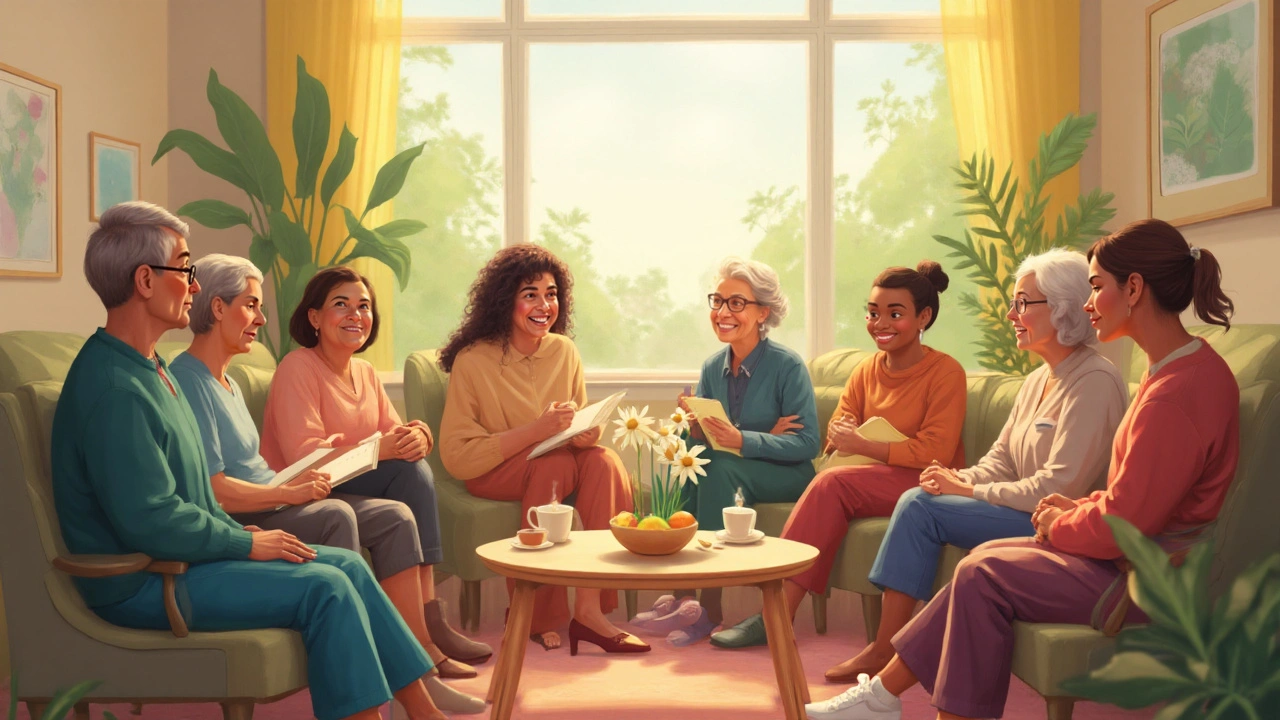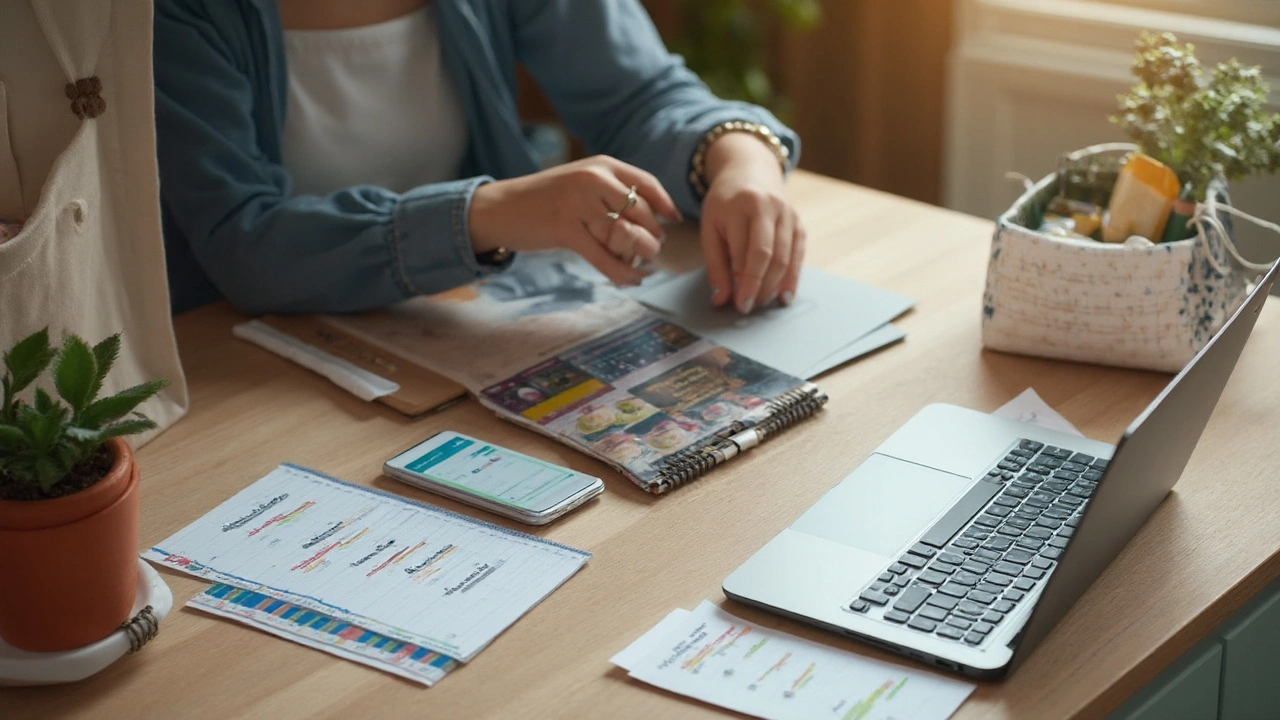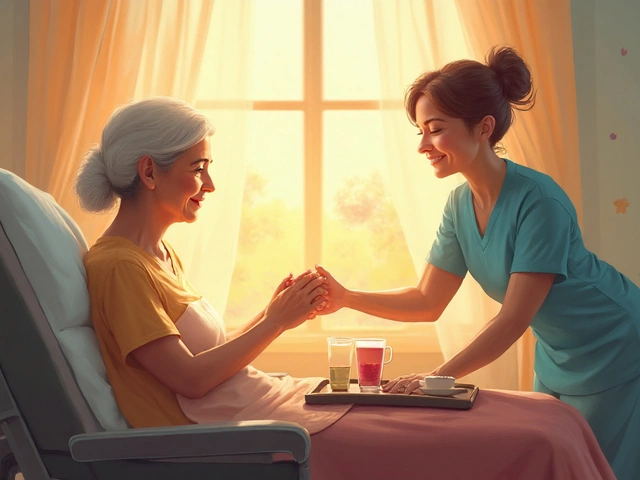TL;DR
- Know what blood cancer is and its common types.
- Use daily emotional‑check‑ins to stay grounded.
- Build a support network that mixes peers, professionals, and online tools.
- Plan nutrition, activity, and rest around treatment cycles.
- Secure financial aid early to avoid surprise bills.
What is Blood Cancer?
Blood cancer is a group of malignancies that affect the blood, bone marrow, or lymphatic system. It includes leukemia, lymphoma, and multiple myeloma. In Australia, roughly 4,000 new cases are diagnosed each year, and five‑year survival rates vary from 30% for aggressive acute leukaemia to over 80% for many indolent lymphomas (Australian Institute of Health and Welfare, 2023).
Understanding the biology helps patients grasp why treatment often involves chemotherapy, targeted agents, or stem‑cell transplantation. But numbers alone don’t ease the fear that comes with the label.
Emotional Impact on the Patient
Patient is a person who has received a medical diagnosis and is undergoing treatment or monitoring. Typical reactions include shock, anxiety, grief, and sometimes denial. A 2022 longitudinal study of 1,200 haematology patients showed that 68% reported moderate to severe anxiety within the first three months of diagnosis.
Tips to manage emotions:
- Schedule a "worry window" of 15 minutes each day to write down fears, then set them aside.
- Practice grounding techniques - 4‑7‑8 breathing or the "5‑4‑3‑2‑1" sensory exercise.
- Ask the oncology team for a clear treatment timeline; uncertainty fuels anxiety.
- Consider a short‑term referral to a psycho‑oncologist for coping‑skill training.
The Caregiver’s Role
Caregiver is a family member, friend, or professional who provides physical, emotional, or logistical support to a patient. Caregivers often juggle work, household duties, and medical appointments, leading to burnout if boundaries aren’t set.
Key actions for caregivers:
- Create a shared calendar (Google Calendar, Outlook) that tracks chemo dates, lab results, and medication refills.
- Allocate "me time" - at least 30 minutes of uninterrupted activity each day, even if it’s a morning coffee.
- Learn basic symptom‑check skills (e.g., fever >38°C, uncontrolled pain) to act quickly without over‑monitoring.
- Join a caregiver‑specific support group to exchange practical hacks.
Building a Support Network
Support can be formal (hospital‑run groups) or informal (online forums). Below is a quick comparison of three common options.
| Option | Format | Accessibility | Typical Cost | Best For |
|---|---|---|---|---|
| Support group | In‑person, weekly meetings | Hospital or community centre, wheelchair‑friendly | Free-$20 donation | People who value face‑to‑face sharing |
| Online forum | Asynchronous web‑based threads | 24/7 access on phone or computer | Free | Tech‑savvy patients in remote areas |
| Professional counseling | One‑on‑one sessions (in‑person or telehealth) | Requires appointment, insurance or Medicare rebate | $80-$150 per session (often subsidised) | Those needing structured therapeutic guidance |
Mixing at least two of these options provides both immediacy and depth; many patients find weekly group meetings complemented by online chats during treatment cycles.

Managing Treatment Side Effects
Nutrition plan is a personalized dietary strategy designed to support immunity, maintain weight, and mitigate medication‑related nausea. Key points:
- Prioritise protein (lean meats, legumes, Greek yoghurt) to aid tissue repair.
- Small, frequent meals reduce nausea - think smoothies, broth‑based soups, and oatmeal.
- Hydration matters: electrolytes (coconut water, oral rehydration salts) help after chemotherapy‑induced vomiting.
- Consult a dietitian affiliated with your hematology clinic.
Physical activity doesn’t need to be intense. Light walks, chair‑based stretching, or gentle yoga improve fatigue scores by 15‑20% (Australian Cancer Council, 2022).
Practical Logistics: Money, Work, and Appointments
Financial assistance is a set of government, nonprofit, and private programs that help offset medical and living costs for cancer patients. In Australia, the Patient Assistance Fund, Cancer Council grants, and state‑based health cards cover travel, prescription co‑pays, and sometimes home‑care aides.
Steps to secure aid:
- Ask the hospital social worker for a list of eligible programs.
- Gather documentation: diagnosis letter, income proof, and treatment schedule.
- Submit applications within the first month of diagnosis; many are retroactive up to three months.
- Notify your employer early - the Fair Work Act provides up to 12 weeks of paid sick leave for serious illness.
Keeping a spreadsheet of expenses (medical, travel, home‑care) simplifies reimbursement requests.
Mind‑Body Strategies for Daily Resilience
Beyond diet and exercise, mind‑body practices lower cortisol levels and improve sleep quality.
- Guided meditation: Apps like Insight Timer offer oncology‑specific sessions (10‑minute body scans).
- Creative outlets: Journaling, sketching, or playing an instrument provides an emotional release without demanding physical stamina.
- Peer storytelling: Sharing your story in a support group or on a blog normalises the experience and can inspire others.
Integrate one new habit each week; over a month you’ll notice steadier mood swings and better pain perception.
Next Steps and Resources
This article sits within a broader health cluster that covers diagnosis basics, treatment options, and survivorship. If you’ve just learned about your condition, you might also want to read “Understanding Different Types of Blood Cancer” or “What to Expect During Chemotherapy”. For long‑term planning, look for “Life After Treatment: Monitoring and Lifestyle”.
Remember, coping is a marathon, not a sprint. Use the tips above as a toolbox, pick what feels right, and adjust as you travel the treatment road.

Frequently Asked Questions
How soon should I start looking for financial assistance?
Ideally within the first month after diagnosis. Early contact with a hospital social worker speeds up paperwork, and many programs reimburse expenses retroactively up to three months.
Can I join a support group if I live in a regional area?
Yes. Many cancer centres run satellite groups in regional towns, and online forums fill the gap when travel isn’t feasible. Look for state‑run tele‑support sessions that combine video and chat.
What dietary changes are most helpful during chemotherapy?
Focus on high‑protein, low‑fat meals and keep portions small. Incorporate bland foods (toast, rice, bananas) if nausea is an issue, and stay hydrated with electrolyte‑rich fluids.
How can caregivers avoid burnout?
Set clear boundaries, schedule regular "me time," share responsibilities with other family members, and seek caregiver‑specific counseling or peer support groups.
Is it safe to exercise during treatment?
Mild to moderate activity, such as walking or yoga, is generally safe and can reduce fatigue. Always check with your oncologist before starting a new regimen, especially if you have low blood counts.


harvey karlin
September 26, 2025 AT 02:49Just finished chemo week 3. This post is a godsend. The 4-7-8 breathing trick? Life-changing. I’ve been doing it before every infusion-stops the panic spiral cold. Also, the nutrition tips? My dietitian is now using your exact wording. Thanks for the clarity.
Anil Bhadshah
September 27, 2025 AT 23:03Thank you for this 🙏 I’m from Mumbai and we don’t have easy access to psycho-oncologists. But I found a free WhatsApp group for blood cancer patients in India-same tips, just in Hindi. Sharing it here if anyone needs it: [link]. Small things help.
lili riduan
September 28, 2025 AT 00:16I’m a caregiver for my mom, and this article made me cry-not because it’s sad, but because someone finally said it: ‘me time’ isn’t selfish. I took 45 minutes today to just sit in my car and listen to jazz. No phone. No guilt. I feel like a human again.
VEER Design
September 28, 2025 AT 06:41Man, I used to think ‘mind-body’ stuff was all woo-woo… until I started journaling. Not ‘Dear Diary’ stuff-just scribbling angry words on a napkin after a bad blood test. Then burning it. Feels like releasing a demon. Now I do it every Friday. Weird? Maybe. Effective? Hell yes.
ANTHONY MOORE
September 28, 2025 AT 21:11Been reading this thread while waiting for my dad’s labs. Honestly? This is the first time I’ve felt less alone since this started. No drama, no BS-just real talk. Thanks everyone.
Trupti B
September 29, 2025 AT 00:53i just got diagnosed and i dont know what to do anymore like i cant even eat and my head hurts and why is everyone so calm like im dying here
Leslie Ezelle
September 29, 2025 AT 01:24Oh please. You think journaling and breathing exercises fix leukemia? This post is a sugar-coated pamphlet from a hospital that doesn’t understand real suffering. Chemo doesn’t care about your ‘worry window.’ It eats your marrow. Stop pretending positivity is a treatment.
Dilip p
September 29, 2025 AT 08:14Leslie, you’re right that chemo is brutal. But dismissing tools that help people cope doesn’t make you stronger-it makes you isolated. The science behind grounding techniques is real. It doesn’t cure cancer, but it keeps the soul from unraveling. That’s worth something.
Vivian Chan
September 30, 2025 AT 05:55Who funded this article? Big Pharma? The ‘support groups’ are all run by hospitals that push chemo. Did you know stem-cell transplants are 90% profit-driven? The real cure is alkaline diets and cannabis oil. Google ‘Dr. Sattler’s protocol.’ They silenced him.
andrew garcia
October 1, 2025 AT 02:29While I appreciate the intent of this post, I must respectfully challenge the assumption that all patients want ‘tools’ or ‘tips.’ Some just want to be held. Some want silence. Not every soul needs fixing. Sometimes, presence is the only medicine.
Jose Lamont
October 2, 2025 AT 23:31Andrew said it perfectly. I sat with my brother during his last week. We didn’t talk about breathing or budgets. We watched old Star Trek episodes and ate ice cream straight from the tub. That was healing. Not because it was ‘productive’-but because it was human.
Tejas Manohar
October 3, 2025 AT 09:34As a medical professional who has worked in hematology for over 18 years, I commend the structure and evidence-based approach of this article. However, I must emphasize that financial assistance applications must be submitted within 30 days to qualify for retroactive reimbursement under Medicare Part B. Many families miss this window due to administrative overwhelm. Please, consult your social worker immediately upon diagnosis. Delay is the enemy.
Jason Kondrath
October 4, 2025 AT 22:52Look, this is just a glorified patient handout. Everyone knows about Google Calendars and protein shakes. Where’s the real insight? The hard truth? That most patients die broke and alone? That ‘support groups’ are just echo chambers for people who refuse to accept mortality? This feels like corporate wellness fluff dressed in medical jargon.
Mohd Haroon
October 6, 2025 AT 11:25Jason, your cynicism is not wisdom-it is the shadow of fear. We do not write these guides to deny suffering. We write them to offer light in the dark, not to pretend the dark does not exist. The fact that you reject tools of coping does not invalidate their use for others. To suffer alone is not noble. To seek solidarity is human.
Kathleen Root-Bunten
October 6, 2025 AT 15:03I’m curious-has anyone here tried the ‘peer storytelling’ method? I started a private blog and shared it with three other patients. It’s not public, just us. We write one paragraph a week. It’s helped me feel less like a ‘case’ and more like a person. Would anyone else be open to that?
Nick Bercel
October 7, 2025 AT 01:50Just wanted to say… thank you. This thread? It’s the only place I don’t feel like I’m pretending to be okay. I’m not a fighter. I’m not a survivor. I’m just tired. And that’s okay.
Ruth Gopen
October 7, 2025 AT 13:35Everyone needs to be more careful. This is a public forum. You’re sharing personal health details, emotional vulnerabilities, and even financial info. What if someone uses this to target you? Scammers are already mining cancer forums for identities and insurance details. Please, stop oversharing. You’re not helping-you’re endangering.